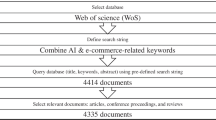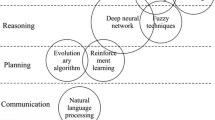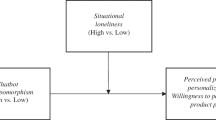Abstract
In the last decade there have been a large number of proposals in the field of Critique-based Recommenders. Critique-based recommenders are data-driven in their nature since they use a conversational cyclical recommendation process to elicit user feedback. In the literature, the proposals made differ mainly in two aspects: in the source of data and in how this data is analyzed to extract knowledge for providing users with recommendations. In this paper, we propose new algorithms that address these two aspects. Firstly, we propose a new algorithm, called HOR, which integrates several data sources, such as current user preferences (i.e., a critique), product descriptions, previous critiquing sessions by other users, and users’ opinions expressed as ratings on social media web sites. Secondly, we propose adding compatibility and weighting scores to turn user behavior into knowledge to HOR and a previous state-of-the-art approach named HGR to help both algorithms make smarter recommendations. We have evaluated our proposals in two ways: with a simulator and with real users. A comparison of our proposals with state-of-the-art approaches shows that the new recommendation algorithms significantly outperform previous ones.






Similar content being viewed by others
Notes
In this work, we use the term user to refer to both an e-commerce customer/shopper and a recommender system user.
In high-risk product domains, the task of locating a desired choice among a large set of options is indeed becoming intimidating for the average customer (Chen and Pu 2012) because there are so many available alternatives.
In complex product spaces, users require a good knowledge of the large amount of characteristics of the products and their relationship with the different available options.
Also referred to as critique-based recommenders in the literature.
A perceptive feature is a feature that provides an immediate and intuitive recognition or appreciation of the qualities of a product. For example, in the SMARTPHONE domain, performance is a perceptive feature that intuitively includes more than one of the technical features of a product (e.g., storage, RAM, or CPU).
To simplify the example, we only show the name of the model of the recommended product ri, but the pair contains all of the features of the product.
This data set was automatically obtained from opinions in the web http://www.gsmarena.com and it is available on demand.
This data set stems from a recent crawl of an online restaurant database for Dublin in the web http://www.tripadvisor.co.uk. Moreover, it has been used in Salem et al. (2014) and was kindly provided by the authors.
The application is available in http://164.77.134.92:8081/WebRec/signin.htm and a video featuring the most important parts of our system is available in https://youtu.be/HTH-9wyTGjU
References
Bland, J.M., & Altman, D.G. (1995). Multiple significance tests: the bonferroni method. Bmj, 310(6973), 170.
Bridge, D., Göker, M.H., McGinty, L., Smyth, B. (2005). Case-based recommender systems. Knowledge Engineering Review, 20(3), 315–320.
Brynjolfsson, E., Hitt, L.M., Kim, H.H. (2011). Strength in numbers: how does data-driven decision making affect firm performance? Available at SSRN: https://ssrn.com/abstract=1819486 or https://doi.org/10.2139/ssrn.1819486.
Burke, R., Hammond, K., Yound, B. (1997). The FindMe approach to assisted browsing. IEEE Expert.
Chen, L., & Pu, P. (2006). Evaluating critiquing-based recommender agents. In Proceedings of the national conference on artificial intelligence (Vol. 21, pp. 157–162).
Chen, L., & Pu, P. (2007). Preference-based organization interfaces: aiding user critiques in recommender systems. In User modeling 2007 (pp. 77–86). Springer.
Chen, L., & Pu, P. (2012). Critiquing-based recommenders: survey and emerging trends. User Modeling and User-Adapted Interaction, 22(1–2), 125–150.
Contreras, D. (2015). Salamó: on the use of user-generated content in critiquing recommendation. In Proceedings of the XVIII international conference of the catalan association for articial intelligence (pp. 195–204).
Contreras, D., Salamȯ, M., Rodríguez, I., Puig, A. (2015). A 3d visual interface for critiquing-based recommenders: architecture and interaction. International Journal of Artificial Intelligence and Interactive Multimedia, 3(3), 7–15.
Demšar, J. (2006). Statistical comparisons of classifiers over multiple data sets. The Journal of Machine Learning Research, 7, 1–30.
Dong, R., O’Mahony, M., Schaal, M., McCarthy, K., Smyth, B. (2013a). Sentimental product recommendation. In Proceedings of the 7th ACM conference on recommender systems (pp. 411–414). ACM.
Dong, R., Schaal, M., O’Mahony, M., McCarthy, K., Smyth, B. (2013b). Opinionated product recommendation. In Case-based reasoning research and development, LNCS (Vol. 7969, pp. 44–58). Springer.
Elahi, M., Ricci, F., Rubens, N. (2014). Active learning strategies for rating elicitation in collaborative filtering: a system-wide perspective. ACM Transactions on Intelligent Systems and Technology, 5(1), 13,1–13,33.
Felfernig, A., & Burke, R. (2008). Constraint-based recommender systems: technologies and research issues. In Proceedings of the 10th international conference on electronic commerce (pp. 3:1–3:10). ACM.
Felfernig, A., Friedrich, G., Jannach, D., Zanker, M. (2015). Recommender systems handbook, 2nd edn., chap. constraint-based recommender systems. Springer Publishing Company Incorporated.
Friedman, M. (1940). A comparison of alternative tests of significance for the problem of m rankings. The Annals of Mathematical Statistics, 11(1), 86–92.
Konstan, J., & Riedl, J. (2012). Recommender systems: from algorithms to user experience. User Modeling and User-Adapted Interaction, 22(1–2), 101–123.
Koren, Y., & Bell, R. (2011). Advances in collaborative filtering. In Recommender systems handbook (pp. 145–186). Springer.
Mandl, M., & Felfernig, A. (2012). Improving the performance of unit critiquing. In User modeling, adaptation, and personalization (Vol. 7379, pp. 176–187). Springer.
McCarthy, K., Salamó, M., Coyle, L., McGinty, L., Smyth, B., Nixon, P. (2006). Group recommender systems: a critiquing based approach. In Proceedings of the 11th international conference on intelligent user interfaces, IUI ’06 (pp. 267–269). ACM Press.
McCarthy, K., Salem, Y., Smyth, B. (2010). Experience-based critiquing: reusing critiquing experiences to improve conversational recommendation. In Proceedings of the international conference on case base reasoning (pp. 480–494). Springer.
McGinty, L., & Reilly, J. (2011). On the evolution of critiquing recommenders. In Recommender systems handbook (pp. 419–453). Springer.
Mcginty, L., & Smyth, B. (2006). Adaptive selection: an analysis of critiquing and preference-based feedback in conversational recommender systems. International Journal of Electronic and Commerce, 11(2), 35–57.
McSherry, D. (2007). Aha: the ins and outs of critiquing. In Proceedings of the international joint conference on artificial intelligence (pp. 962–967).
Pazzani, M., & Billsus, D. (2007). The adaptive web: methods and strategies of web personalization, chap, content-based recommendation systems, pp. 325–341.
Provost, F., & Fawcett, T. (2013). Data science and its relationship to big data and data-driven decision making. Big Data, 1 (1), 51–59. https://doi.org/10.1089/big.2013.1508.
Pu, P., & Faltings, B. (2004). Decision tradeoff using example-critiquing and constraint programming. Constraints, 9(4), 289–310.
Pu, P., Chen, L., Kumar, P. (2008). Evaluating product search and recommender systems for e-commerce environments. Electronic Commerce Research, 8(1-2), 1–27.
Pu, P., Faltings, B., Chen, L., Zhang, J., Viappiani, P. (2011). Usability guidelines for product recommenders based on example critiquing research. In Recommender systems handbook. Springer.
Reilly, J., McCarthy, K., McGinty, L., Smyth, B. (2004). Dynamic critiquing. In Advances in case-based reasoning, lecture notes in computer science (Vol. 3155, pp. 763–777). Springer.
Reilly, J., McCarthy, K., McGinty, L., Smyth, B. (2005a). Incremental critiquing. Knowledge-Based Systems, 18(4-5), 143–151.
Reilly, J., Smyth, B., McGinty, L., McCarthy, K. (2005b). Critiquing with confidence. In Case-based reasoning research and development, lecture notes in computer science (Vol. 3620, pp. 436–450). Springer.
Reilly, J., Zhang, J., McGinty, L., Pu, P., Smyth, B. (2007). A comparison of two compound critiquing systems. In Proceedings of the 12th int. conf. on intelligent user interfaces (pp. 317–320). USA: ACM.
Ricci, F., & Nguyen, Q. (2007). Acquiring and revising preferences in a critique-based mobile recommender system. IEEE Intelligent Systems, 22(3), 22–29.
Ricci, F., Rokach, L., Shapira, B., Kantor, P.B. (Eds.). (2011). Recommender systems handbook: Springer.
Salamó, M., & Escalera, S. (2012). Increasing retrieval quality in conversational recommenders. IEEE Transactions on Knowledge and Data Engineering, 24(10), 1–14.
Salamó, M., Reilly, J., McGinty, L., Smyth, B. (2005). Improving incremental critiquing. In Proceedings of the 16th artificial intelligence and cognitive science (pp. 379–388).
Salem, Y., & Hong, J. (2013). History-aware critiquing-based conversational recommendation. In Proceedings of the 22Nd international conference on WWW companion (pp. 63–64). Switzerland.
Salem, Y., Hong, J., Liu, W. (2014). History-guided conversational recommendation. In Proceedings of the 23rd international conference on WWW companion (pp. 999–1004).
Smyth, B. (2007). Case-based recommendation. In Brusilovsky, P., Kobsa, A., Nejdl, W. (Eds.) The adaptive web. http://dl.acm.org/citation.cfm?id=1768197.1768210 (pp. 342–376). Berlin: Springer.
Viappiani, P., Faltings, B., Pu, P. (2006). Preference-based search using example-critiquing with suggestions. Journal Artificial Intelligence Research, 27, 465–503.
Zhang, J., & Pu, P. (2006). A comparative study of compound critique generation in conversational recommender systems. In Adaptive hypermedia and adaptive web-based systems, lecture notes in computer science (Vol. 4018, pp. 234–243). Springer.
Zhang, J., Jones, N., Pu, P. (2008). A visual interface for critiquing-based recommender systems. In Proceedings of the 9th ACM conference on electronic commerce (pp. 230–239).
Acknowledgements
This research has also received support from the projects SGR-2017-341 and TIN2015-71147-C2-2 from the Spanish Ministry of Science and Innovation.
Author information
Authors and Affiliations
Corresponding author
Rights and permissions
About this article
Cite this article
Contreras, D., Salamó, M. Data-driven decision making in critique-based recommenders: from a critique to social media data. J Intell Inf Syst 54, 23–44 (2020). https://doi.org/10.1007/s10844-018-0520-9
Received:
Revised:
Accepted:
Published:
Issue Date:
DOI: https://doi.org/10.1007/s10844-018-0520-9




